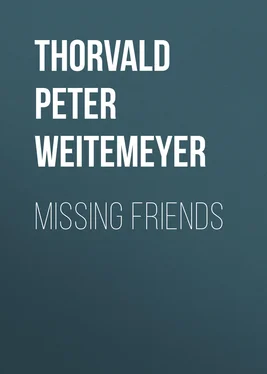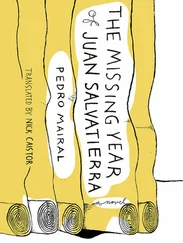Thorvald Peter Ludwig Weitemeyer - Missing Friends
Здесь есть возможность читать онлайн «Thorvald Peter Ludwig Weitemeyer - Missing Friends» — ознакомительный отрывок электронной книги совершенно бесплатно, а после прочтения отрывка купить полную версию. В некоторых случаях можно слушать аудио, скачать через торрент в формате fb2 и присутствует краткое содержание. Жанр: Путешествия и география, foreign_antique, foreign_prose, на английском языке. Описание произведения, (предисловие) а так же отзывы посетителей доступны на портале библиотеки ЛибКат.
- Название:Missing Friends
- Автор:
- Жанр:
- Год:неизвестен
- ISBN:нет данных
- Рейтинг книги:3 / 5. Голосов: 1
-
Избранное:Добавить в избранное
- Отзывы:
-
Ваша оценка:
- 60
- 1
- 2
- 3
- 4
- 5
Missing Friends: краткое содержание, описание и аннотация
Предлагаем к чтению аннотацию, описание, краткое содержание или предисловие (зависит от того, что написал сам автор книги «Missing Friends»). Если вы не нашли необходимую информацию о книге — напишите в комментариях, мы постараемся отыскать её.
Missing Friends — читать онлайн ознакомительный отрывок
Ниже представлен текст книги, разбитый по страницам. Система сохранения места последней прочитанной страницы, позволяет с удобством читать онлайн бесплатно книгу «Missing Friends», без необходимости каждый раз заново искать на чём Вы остановились. Поставьте закладку, и сможете в любой момент перейти на страницу, на которой закончили чтение.
Интервал:
Закладка:
But what was happening now? The constables were running about among the people telling them to stand here and to stand there. All the single girls were packed together up by the wheel as close as they could stand. Then the married men with their families were told to stand as near them as they could, and the single men were again packed as close to them as possible. All of us were now on the quarter-deck. Then came the Queenslanders, the doctor, the captain, and the first mate, and took up a position in front of us down on the deck. One of our own constables with a very sanctimonious face was also there. What did it mean? The Immigration Agent read out of a large protocol, "Anna Frederica Johnston, come forward." "Anna Frederica Johnston, Anna—Anna, Anna Frederica Johnston. They want you—you are wanted; you have to go." The unfortunate girl was half paralyzed with terror, as she came forward. She was a Norwegian. The immigration agent asked her, "Had she been well and kindly treated on the voyage, and was she satisfied?" This had to be translated from German into Norwegian before she understood it. But scarcely did she understand what they said before she cried, "Oh yes, oh yes, I am thankful and satisfied." "Good," she might pass forward. Then another was called who also testified to her kind treatment, and so on until all the girls, even the one who had been tied to the mast, had said they were satisfied and had been well treated. While this was going on, some of the men who stood nearest to me told me to erase their names from the written complaint which I carried. Others advised me that it was now too late altogether to complain; others again said, "Now is the time." I felt myself surprised beyond measure that the Queensland Government should take the trouble to cause such a question to be put to each individual immigrant, and I felt certain that it could not have been Queensland's fault if we had been badly treated. Anyhow, I saw no reason to tell any falsehoods, and my mind was soon made up how to act. As soon as the last girl had declared herself satisfied, the question began with the single men. The first who happened to be called was rather a dense sort of a fellow, and although he had signed the complaint, still he said he was "well satisfied." So then I thought the time had arrived for me to act. I went forward and presented my document written in Danish and addressed to the Danish Consul, Australia; it was translated from Danish to German and from German to English. Meanwhile I glared at the doctor and the doctor glared at me. I felt in rare good humour, the observed of all observers. As a Queenslander would say on such an occasion, it was the proudest moment in my life. I was asked to stand alongside the doctor and captain, and watch my case. The fellow who had already declared himself satisfied was called back and asked had he signed the complaint, and only passed forward after admitting that he had. Then the question to the remainder became, "Have you signed the complaint?"—to which each of them, evidently pleased, replied in the affirmative. Those who had not signed, on saying "no" were then asked "did they wish to sign?" Every one of them signed it then right before the eyes of the doctor. I would as soon that they had not, because it was easily seen that they signed it more because they were asked to do so and did not want to cause trouble, than because they had changed their minds since they had been requested to do the same thing on the voyage. From that time to now I never heard any more about the complaint. Very likely it was forwarded to the proper authorities, and they perhaps took notice of it although unknown to us. The ship was clean when we landed, so were the emigrants, and we had all a healthy, well-fed appearance I am sure, and that must have been greatly in the doctor's favour. But let me say here at once, that if there had been one amongst us who had known the proper way to punish whoever was responsible for our ill-treatment, I believe it would have been a simple matter to have ruined the owners of the ship. If instead of writing our complaint to the Danish Consul, one of us had been able to issue a writ against the doctor upon some definite matter, he could have had as many witnesses as he chose, ready to hand, to prove what the fare of the ship had been. He might have produced his rag of a blanket in court too, and then have claimed damages. I am certain that no Queensland judge or jury would have said, after seeing it, that such a rag, two feet six inches by three feet, was a sufficient covering on a four months' sea voyage, or that the food we received was either sufficient or that it in any way tallied with what we were promised. Such damages as would then have been awarded to the first plaintiff, could indisputably have been claimed by any other emigrant, and that would have meant more than the ship and all that was in it was worth.
My boss told me before the Queenslanders left the ship again that I might, as soon as we landed, come to his house for my food and lodging, and that he would not expect me to go to work for a few days, so that I was well provided for already. Three or four dozen other immigrants had also been engaged by the other Queenslanders, all for thirty pounds a year and rations, on exactly the same agreements as mine. But Thorkill was not among them, and I felt a little ashamed and sorry that it was so, as we had agreed not to part, and I had in this way taken my first chance regardless of him; but he was earnest in his gratulations and certain, he said, he would be right too, somehow. We had all these empty bottles, and we expected nothing less than sixpence, or perhaps a shilling, apiece for them. At least I felt greatly consoled to think of them, and I made up my mind that he should have the whole return from them if he needed it. The next day arrived, when we should go ashore, and, full of excitement and expectations, we sailed up to the jetty. Slow work that; it took us some hours to do it. Every one was hanging over the side of the ship looking to see what the place was like, and watching a number of people who stood there. Now we were alongside, so close that we might have jumped ashore, but still we were forbidden to leave the ship before the doctor, who was ashore, arrived. A man stood on the jetty with a large basketful of bananas, which he offered for sale at sixpence per dozen, and handed them over the side of the ship to any one who would buy. He sold them readily, and my mouth watered to taste them; but I had no money. Thorkill stood alongside me, so he said, "I should like so to taste some of those bananas."
"So should I."
"He charges sixpence per dozen."
"Yes."
"I wonder if he would take a bottle for a dozen?"
"We will try."
I dived into the cabin as fast as I could for a bottle, because the man had only a few bananas left. We had all the bottles, or most of them, wrapped up in paper, and I took one which looked nice and clean, and came out again just in time to secure his attention. Now I had to try to make myself understood. "I give you bottle," said I, "if you give me bananas."
"Are you going to shout?" cried he. "What have you got?"
I did not know what that meant, but as he had a pleased sort of appearance, I nodded and smiled, and caressed the bottle, saying, "Very good, very good bottle."
"All right," said he, "let us see what you have got. I give you some bananas; here you are, hand down your bottle."
So I took the bananas with the one hand, and handed him the bottle with the other.
He took it, smelt it, shook it, pulled off the wrapper, held it up towards the sun, and cried, "Dead mariner, by Jove."
Then every one on the jetty laughed like fun, but I was totally ignorant where the joke came in, and asked, "Is it not a very good bottle?"
"Oh, yes," said he, "splendid bottle," and they all kept on laughing and talking at me, assuring me that I would do well in Queensland! I understood that much.
Читать дальшеИнтервал:
Закладка:
Похожие книги на «Missing Friends»
Представляем Вашему вниманию похожие книги на «Missing Friends» списком для выбора. Мы отобрали схожую по названию и смыслу литературу в надежде предоставить читателям больше вариантов отыскать новые, интересные, ещё непрочитанные произведения.
Обсуждение, отзывы о книге «Missing Friends» и просто собственные мнения читателей. Оставьте ваши комментарии, напишите, что Вы думаете о произведении, его смысле или главных героях. Укажите что конкретно понравилось, а что нет, и почему Вы так считаете.












